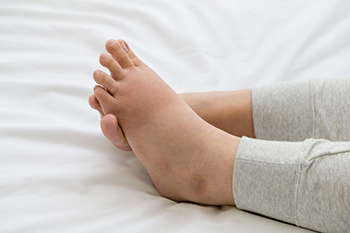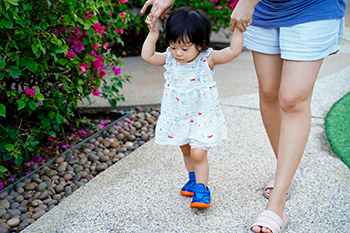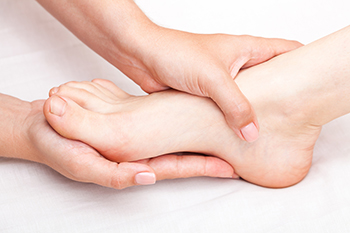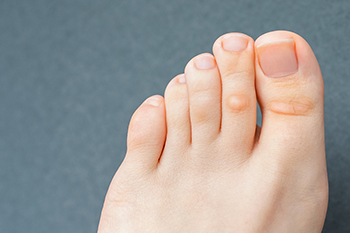December 2023
Are You Suffering From Ingrown Toenails?
Common Reasons Why Feet Can Swell

Swollen feet, a frequent and uncomfortable condition, can be triggered by a variety of factors. One of the most common causes is prolonged standing or sitting, which can cause fluid to accumulate in the lower extremities. Similarly, high salt intake can lead to water retention, resulting in swollen feet. Pregnancy is another well-known cause of foot swelling, due to increased blood volume and pressure on leg veins. Certain medications, like those for hypertension or hormone therapy, may contribute to edema. Injuries, such as sprained ankles or fractures, can also result in localized foot swelling. Additionally, underlying medical conditions like heart disease, kidney problems, or venous insufficiency can lead to edema in the feet. Lymphedema, a condition involving impaired lymphatic system function, is another possible cause. Recognizing the common causes of swollen feet is vital, as it can help you determine whether it is a benign issue or a sign of an underlying health problem. If you are concerned about persistent foot swelling, it is suggested that you consult a podiatrist for a proper diagnosis and guidance on managing the condition.
Swollen feet can be a sign of an underlying condition. If you have any concerns, contact Dr. Robert Marcus of Foot & Ankle Center of Teaneck. Our doctor can provide the care you need to keep you pain-free and on your feet.
Swollen feet are a common ailment among pregnant women and people who stand or sit for extended periods. Aging may increase the possibility of swollen feet and patients who are obese often notice when their feet are swelling too. There may be medical reasons why swollen feet occur:
- Phlebitis - A condition that causes the veins to become inflamed and can also cause leg pain.
- Liver disease - This may lead to low blood levels of albumin which is a protein. This can cause fluid in the blood to pass into the tissues and several areas of the body can become swollen.
- Heart failure - When the heart doesn’t pump properly the blood that is normally pumped back to the heart can pool in the veins of the legs causing swollen feet.
- Kidney disease - One of the main functions of the kidneys is releasing excess fluid in the body. This type of condition can make it difficult for the kidneys to function properly, and as a result the feet may become swollen.
- Deep-vein thrombosis (DVT)- This is a serious condition where blood clots form in the veins of the legs. They can block the return of blood from the legs to the heart which may cause the feet to swell. It is important to be treated by a podiatrist if this condition is present.
Swollen feet can also be caused by bone and tendon conditions, including fractures, arthritis, and tendinitis. Additionally, there may be skin and toenail conditions and an infection may cause the feet to swell. Patients who take medicine to treat high blood pressure may be prone to getting swollen feet.
Many patients elevate their feet to help relieve the swelling and this is generally a temporary remedy. When a podiatrist is consulted the reason behind the swelling can be uncovered and subsequently treated.
If you have any questions please feel free to contact our office located in Teaneck, NJ . We offer the newest diagnostic tools and technology to treat your foot and ankle needs.
The Introduction of Shoes for Babies

The question of when babies should start wearing shoes is a consideration that aligns with their developmental milestones. As a general guideline, infants typically are barefoot in their early months, allowing their delicate feet to explore and develop naturally. Shoes are introduced when babies begin to take their first steps, usually at the age of nine to 12 months. At this stage, shoes provide protection and support for those wobbly steps, aiding in balance and preventing potential injuries. Prioritizing shoes that are lightweight, flexible, and properly fitted is vital, ensuring the natural growth and formation of the feet. Soft-soled shoes with room for toes to move are recommended, promoting proper foot development. As children gradually transition to more stable steps, selecting shoes that accommodate their newfound mobility becomes an essential consideration for their comfort, safety, and continued healthy foot development. If you would like more information about what type of first shoes to buy for your child, it is suggested that you consult a podiatrist.
Making sure that your children maintain good foot health is very important as they grow. If you have any questions, contact Dr. Robert Marcus of Foot & Ankle Center of Teaneck. Our doctor can provide the care you need to keep you pain-free and on your feet.
Keeping Children's Feet Healthy
Having healthy feet during childhood can help prevent medical problems later in life, namely in the back and legs. As children grow, their feet require different types of care. Here are some things to consider...
Although babies do not walk yet, it is still very important to take care of their feet.
Avoid putting tight shoes or socks on his or her feet.
Allow the baby to stretch and kick his or her feet to feel comfortable.
As a toddler, kids are now on the move and begin to develop differently. At this age, toddlers are getting a feel for walking, so don’t be alarmed if your toddler is unsteady or ‘walks funny’.
As your child gets older, it is important to teach them how to take care of their feet.
Show them proper hygiene to prevent infections such as fungus.
Be watchful for any pain or injury.
Have all injuries checked by a doctor as soon as possible.
Comfortable, protective shoes should always be worn, especially at play.
If you have any questions please feel free to contact our office located in Teaneck, NJ . We offer the newest diagnostic and treatment technologies for all your foot and ankle needs.
How Podiatrists Can Help You

In our daily lives, there are habits that can harm our foot health, and podiatrists can provide advice to help us break them. Examples of that are provided here. Attempting DIY ingrown toenail removal with non-sterile tools can lead to infections. Believing our shoe size remains constant is a misconception. Periodic foot measurements and trying different brands can help find the best fit. Wearing flats as daily footwear may lack cushioning for shock absorption, causing heel pain or metatarsalgia. Walking barefoot on surfaces like hardwood floors can lead to issues. Worn-out shoes affect body alignment and should be replaced when they show wear. Protect your feet in locker rooms with flip-flops. Running without socks increases the risk of blisters and infections. Using running shoes for different sports can cause injury, and appropriate gear for specific sports should be invested in. Most importantly, if you have foot injuries, infections, or seek appropriate footwear recommendations tailored to your specific foot shape and function, it is suggested that you schedule an appointment with a podiatrist who can help with all foot and ankle-related issues.
If you are experiencing pain in the feet or ankles, don’t join the stubborn majority refusing treatment. Feel free to contact Dr. Robert Marcus from Foot & Ankle Center of Teaneck. Our doctor can provide the care you need to keep you pain-free and on your feet.
What Is a Podiatrist?
Someone would seek the care of a podiatrist if they have suffered a foot injury or have common foot ailments such as heal spurs, bunions, arch problems, deformities, ingrown toenails, corns, foot and ankle problems, etc.
Podiatric Treatment
A podiatrist will treat the problematic areas of the feet, ankle or lower leg by prescribing the following:
- Physical therapy
- Drugs
- Orthotic inserts or soles
- Surgery on lower extremity fractures
A common podiatric procedure a podiatrist will use is a scanner or force plate which will allow the podiatrist to know the designs of orthotics. Patients are then told to follow a series of tasks to complete the treatment. The computer will scan the foot a see which areas show weight distribution and pressure points. The podiatrist will read the analysis and then determine which treatment plans are available.
If you have any questions please feel free to contact our office located in Teaneck, NJ . We offer the newest diagnostic and treatment technologies for all your foot and ankle needs.
What Are the Common Causes of Corns on the Feet?

Corns, those small, often painful patches of thickened skin, are a common foot woe with various underlying causes. One frequent instigator is wearing ill-fitting footwear, particularly shoes that squeeze or rub against certain areas of the foot, creating friction and pressure. High heels, narrow shoes, or those with inadequate cushioning can contribute to the development of corns. Structural abnormalities, such as bunions or hammertoes, alter the distribution of weight on the feet, leading to increased friction and corn formation. Repetitive actions or activities that place excessive pressure on specific areas of the feet can also trigger corns. Additionally, individuals with gait abnormalities may be more prone to developing corns due to altered foot mechanics. Understanding these common causes allows for proactive measures, such as choosing proper footwear and addressing structural issues. If you have developed a corn on your foot, it is suggested that you visit a podiatrist who can treat it accordingly and offer appropriate prevention techniques.
Corns can make walking very painful and should be treated immediately. If you have questions regarding your feet and ankles, contact Dr. Robert Marcus of Foot & Ankle Center of Teaneck. Our doctor will treat your foot and ankle needs.
Corns: What Are They? And How Do You Get Rid of Them?
Corns are thickened areas on the skin that can become painful. They are caused by excessive pressure and friction on the skin. Corns press into the deeper layers of the skin and are usually round in shape.
Ways to Prevent Corns
There are many ways to get rid of painful corns such as:
- Wearing properly fitting shoes that have been measured by a professional
- Wearing shoes that are not sharply pointed or have high heels
- Wearing only shoes that offer support
Treating Corns
Although most corns slowly disappear when the friction or pressure stops, this isn’t always the case. Consult with your podiatrist to determine the best treatment option for your case of corns.
If you have any questions please feel free to contact our office located in Teaneck, NJ . We offer the newest diagnostic and treatment technologies for all your foot and ankle needs.







